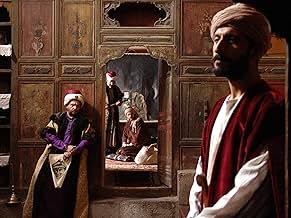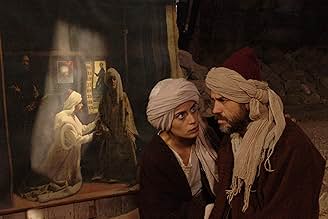Cenneti Beklerken
- 2006
- 1 h 47 min
AVALIAÇÃO DA IMDb
6,5/10
1,7 mil
SUA AVALIAÇÃO
Adicionar um enredo no seu idiomaIn 17th century Istanbul, a renowned miniature artist is forcefully brought to a vizier's mansion, where he becomes entangled in political intrigue involving a rebellious Ottoman prince.In 17th century Istanbul, a renowned miniature artist is forcefully brought to a vizier's mansion, where he becomes entangled in political intrigue involving a rebellious Ottoman prince.In 17th century Istanbul, a renowned miniature artist is forcefully brought to a vizier's mansion, where he becomes entangled in political intrigue involving a rebellious Ottoman prince.
- Prêmios
- 8 vitórias e 9 indicações no total
Avaliações em destaque
It was very interesting movie for a period of ottoman empire. The movie and miniatures interfacing together in the movie. You can see the miniatures then a scene from the movie. Especially the traveling scenes are great for miniatures and when eflatun was going to east with the men of vizier. I also traveled with them.
In the movie there was a place vizier says " the world not only needs justice but also needs goodness". I enjoyed with many quotes from this movie...
there are also some mistakes but I think these all came from production cost.
I congratulate the director, all actors, and actresses. Thank you it was nice to watch such a nice movie.
In the movie there was a place vizier says " the world not only needs justice but also needs goodness". I enjoyed with many quotes from this movie...
there are also some mistakes but I think these all came from production cost.
I congratulate the director, all actors, and actresses. Thank you it was nice to watch such a nice movie.
The director Dervis Zaim used a different technique, combining the modern cinema with an ancient art Miniature, never consists of light, shadow, volume and perspective, to explain the unknown situation in 17th century of Ottoman Empire. While watching the movie every scene seemed as a part of art in terms of color, costumes, light and impression. The audience may either find some clues about the system of the Empire such as life style, architecture, desires of Sultan's son to govern the empire and janissaries which are peculiar to Ottomans, or feel philosophical notions which are hidden behind abstract concepts like dreams, life, death, art and heaven. The sentence of Vizier (Vezir) "Both justice and beauty are necessary for Universe" is the sentence which can be counted as favorite quote of movie.
Most people who watched the movie sought historical truth in the script.
However, this movie is a 'fairytale' fiction.
Examining a work in such detail sometimes causes the things it tells to go unnoticed.
However, this movie is a 'fairytale' fiction.
Examining a work in such detail sometimes causes the things it tells to go unnoticed.
To date CENNETI BEKLERKEN has been the only totally historical drama in director Dervis Zaim's oeuvre.
However, as expected from a director so preoccupied with temporal relationships, the action consciously oscillates between different levels of reality. It is basically a quest-narrative focusing on hard-pressed miniaturist Eflatun (Serhat Tutumler) who is forced on an expedition to quell a rebellion against the Sultan, and to draw the head of the rebel, once he is eventually killed. Unwilling to undertake the duty, he is forced to on pain of death. He eventually completes his task, but finds the Sultan's reaction is not what he anticipated.
Within this structure director Zaim offers a meditation on the miniaturist's art. It was said that a good artist was in contact with the divinity; Zaim does not go that far, but does suggest that he is equipped with the power to deconstruct realities. This is suggested through a remaking of Velazquez's "Las Meninas," which appears as a work dedicated to rebel leader Danyal (Nihat Ileri), using the original Velasquez form, but adapted to Ottoman cultures. Through this device Zaim makes us reflect on whom art belongs to, and the role of the viewer in the artistic exchange.
Like many of Zaim's films, CENNETI BEKLERKEN is a work that befits repeated viewings, so as to uncover its subtleties. It is not an easy watch, but ultimately a rewarding one.
However, as expected from a director so preoccupied with temporal relationships, the action consciously oscillates between different levels of reality. It is basically a quest-narrative focusing on hard-pressed miniaturist Eflatun (Serhat Tutumler) who is forced on an expedition to quell a rebellion against the Sultan, and to draw the head of the rebel, once he is eventually killed. Unwilling to undertake the duty, he is forced to on pain of death. He eventually completes his task, but finds the Sultan's reaction is not what he anticipated.
Within this structure director Zaim offers a meditation on the miniaturist's art. It was said that a good artist was in contact with the divinity; Zaim does not go that far, but does suggest that he is equipped with the power to deconstruct realities. This is suggested through a remaking of Velazquez's "Las Meninas," which appears as a work dedicated to rebel leader Danyal (Nihat Ileri), using the original Velasquez form, but adapted to Ottoman cultures. Through this device Zaim makes us reflect on whom art belongs to, and the role of the viewer in the artistic exchange.
Like many of Zaim's films, CENNETI BEKLERKEN is a work that befits repeated viewings, so as to uncover its subtleties. It is not an easy watch, but ultimately a rewarding one.
"Waiting for Heaven" (Cenneti Beklerken), directed by Dervish Zaim, is a visually captivating and intellectually stimulating Turkish film that premiered in 2006. Set against the backdrop of the 17th century Ottoman Empire, the story follows Eflatun, a miniaturist commissioned to create a watercolor portrait of a rebellious leader in a Western style, which will help confirm the leader's identity. As Eflatun undertakes this task, he finds himself caught in a complex web of political intrigue and personal conflicts.
The film excels in immersing viewers in a richly textured historical environment, beautifully showcasing the essence of the Ottoman period through its breathtaking cinematography and careful production design. Zaim's meticulous attention to detail shines through in every scene, from the elaborate costumes to the exquisite artwork that Eflatun produces.
Yet, "Waiting for Heaven" is more than just a visual delight; it explores profound themes of faith, artistry, and the search for life's meaning. Eflatun's journey is both a physical and symbolic one, as he confronts his beliefs and the societal pressures that challenge his moral compass. Having lost his wife and children, he encounters an enslaved woman with whom he falls in love. The film prompts viewers to reflect on the role of religion in society and the individual's duty to maintain their principles amidst challenges.
The performances are compelling, particularly Serhat Tutumluer's portrayal of Eflatun, which is both nuanced and reflective. While some may find the pacing slow, those who enjoy a contemplative and philosophical narrative will appreciate the depth of "Waiting for Heaven."
This thought-provoking film provides a distinctive viewpoint on a captivating historical era, celebrating the power of art and the timeless human quest for truth and enlightenment.
The film excels in immersing viewers in a richly textured historical environment, beautifully showcasing the essence of the Ottoman period through its breathtaking cinematography and careful production design. Zaim's meticulous attention to detail shines through in every scene, from the elaborate costumes to the exquisite artwork that Eflatun produces.
Yet, "Waiting for Heaven" is more than just a visual delight; it explores profound themes of faith, artistry, and the search for life's meaning. Eflatun's journey is both a physical and symbolic one, as he confronts his beliefs and the societal pressures that challenge his moral compass. Having lost his wife and children, he encounters an enslaved woman with whom he falls in love. The film prompts viewers to reflect on the role of religion in society and the individual's duty to maintain their principles amidst challenges.
The performances are compelling, particularly Serhat Tutumluer's portrayal of Eflatun, which is both nuanced and reflective. While some may find the pacing slow, those who enjoy a contemplative and philosophical narrative will appreciate the depth of "Waiting for Heaven."
This thought-provoking film provides a distinctive viewpoint on a captivating historical era, celebrating the power of art and the timeless human quest for truth and enlightenment.
Principais escolhas
Faça login para avaliar e ver a lista de recomendações personalizadas
Detalhes
- Data de lançamento
- Países de origem
- Central de atendimento oficial
- Idioma
- Também conhecido como
- Waiting for Heaven
- Locações de filme
- Empresas de produção
- Consulte mais créditos da empresa na IMDbPro
Bilheteria
- Faturamento bruto mundial
- US$ 346.857
- Tempo de duração
- 1 h 47 min(107 min)
- Cor
- Proporção
- 1.85 : 1
Contribua para esta página
Sugerir uma alteração ou adicionar conteúdo ausente

























